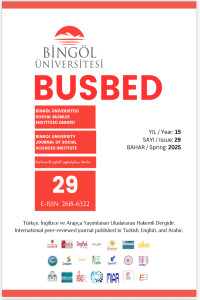DIGITAL GAME-BASED LEARNING FOR GRAMMAR IN EFL CONTEXTS: A SYSTEMATIC REVIEW
DIGITAL GAME-BASED LEARNING FOR GRAMMAR IN EFL CONTEXTS: A SYSTEMATIC REVIEW
Author(s): Hanife ÖZTÜRK-TAŞ, Neslihan KELEŞ, Elif AYDIN-YAZICISubject(s): Foreign languages learning, Language acquisition, Distance learning / e-learning
Published by: Bingöl Üniversitesi Sosyal Bilimler Enstitüsü
Keywords: Digital game-based learning; Gamification; Grammar; L2; Language learning;
Summary/Abstract: There is a need for foreign language learners to use efficient grammar learning techniques, considering the importance of grammar knowledge for learning English. Game-based language learning, particularly in grammar, has gained attention from learners, educators, practitioners, and academics due to technological advancements and its significant potential. Searching WOS, ERIC, and Scopus employing the predetermined Boolean search string, this systematic review examines the utilization of digital game-based learning in teaching and learning grammar in EFL contexts. To guarantee a systematic, transparent, and meticulous selection and analysis of pertinent literature, this study implemented the PRISMA 2020 (Preferred Reporting Items for Systematic Reviews and Meta-Analyses) framework. For this systematic review, 24 publications dating from 2010 through 2022 were analysed to highlight the foci of this field of research. In the study, Zotero was employed to eliminate duplicate articles, Rayyan facilitated the screening and selection process, and MaxQDA was used for coding the selected studies. The results indicated that quantitative methods were more commonly used than mixed and qualitative. The detailed analysis showed that the studies employed various digital game-based tools, with Kahoot! being used frequently and incorporating gamification elements, particularly feedback and competition. The analysis of cognitive, affective, and behavioural outcomes suggested that digital tools positively affect learners’ achievements and performance, increase motivation and satisfaction, and significantly improve engagement in digital gamebased grammar learning and teaching.
Journal: Bingöl Üniversitesi Sosyal Bilimler Enstitüsü Dergisi (BUSBED)
- Issue Year: 15/2025
- Issue No: 29
- Page Range: 396-415
- Page Count: 20
- Language: English

